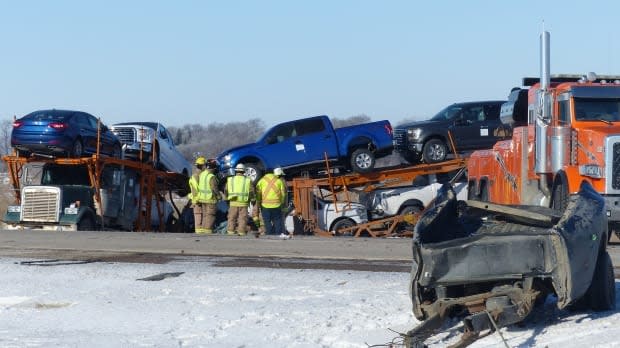Sask. man pleads guilty to 6 counts stemming from fatal 2016 crash

Warning: This article contains distressing details.
A Saskatchewan man who appealed a previous conviction stemming from a fatal crash in 2016 near Langham, Sask, has now pleaded guilty to six charges.
Robert Major, 39, pleaded guilty Friday morning at the Court of King's Bench in Saskatoon to three counts each of dangerous driving causing death and dangerous driving causing bodily harm.
Court documents outline how on Feb. 22, 2016, Major sped into a Highway 16 intersection about 8.5 kilometres west of Langham, smashing into the side of a semi heading west on the highway.
Major's girlfriend and two of his sons — aged four and nine — died. The other occupants of the vehicle — Major's nephew, his five-year-old son and an employee of Major's — survived with varying injuries. Major's nephew had both of his legs broken.
"It was a terrible tragedy that has impacted everybody," said Brian Pfefferle, Major's defence lawyer, calling it one of the biggest tragedies that the provincial justice system has seen.

The Crown and defence submitted a joint recommendation for a five-year sentence with credit for time served to Justice Richard Danyliuk Friday.
"Conclusion of the matter is what we're looking for and this is the process that brings us to a conclusion," Pfefferle said.
"In a theoretical sense this is concluding, but there's no conclusion for the real victims in this case, in many respects they're trapped in that crash for the rest of their lives."
He said avoiding a trial also avoids retraumatizing witnesses who already had to go through a very emotionally previous trial on the matter.
What happened during the crash?
According to court documents, the electronic data recorder taken from Major's vehicle showed he had been driving 137 km/h and was at about 118 km/h immediately before hitting the semi. Court heard Major's first trial that he had been using his cellphone when he crashed.
The crash sent the semi, which was hauling two steel-framed trailers carrying seven trucks and two cars to a dealership, more than 80 metres into a ditch. The semi weighed about 36,000 kilograms, court heard at the original trial.
The collision caused the semi to jackknife and clamp the truck between the trailers. The engine was also ripped from the truck's engine bay during the crash.
None of the passengers in Major's truck were wearing a seatbelt. It took several hours after the crash to extricate the people from his truck.
What is the trajectory of the seven-year-long case?
A jury found Major guilty on 12 counts of dangerous driving and criminal negligence causing death in early 2019.
He was sentenced to seven years in prison, but he later appealed.
The Court of Appeal granted Major a release pending his appeal in late 2019.
In July 2022, appeal judges found that while police did not infringe on Major's rights by obtaining the event data recorder from his truck without a warrant — which tracked his speed and braking among other things — the evidence from the recorder was admitted into evidence without "proper foundation."
The sentence was overturned and a new trial ordered.
That new trial was avoided with Major's guilty plea.
"I don't want to speak for each of the family members, but I think they're satisfied with the results," said Crown prosecutor Andrew Clements.
"They're happy that the matter is being concluded and that Mr. Major will serve a jail sentence. But I think what's most important for them is that they can finally have a resolution to the case."


